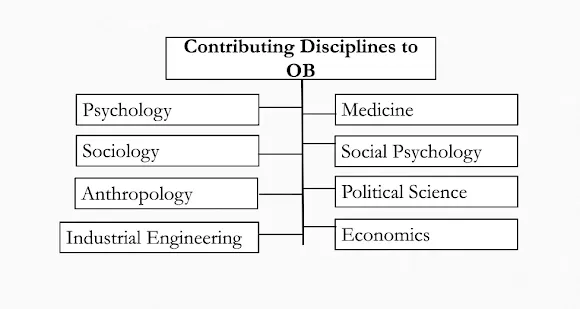Table of Contents:-
- Contributing Disciplines to Organisational Behaviour – OB
- Determinants of Organisational Behaviour – OB
Contributing Disciplines to Organisational Behaviour – OB
Organisational Behaviour is an applied behavioural science based on contributions from numerous behavioural disciplines. These contributing disciplines to organisational behaviour – ob is described as follows: Disciplines of OB:
- Psychology
- Medicine
- Sociology
- Social psychology
- Anthropology
- Political Science
- Industrial Engineering
- Economics
Contributing disciplines to organisational behaviour are given below:
1) Psychology
Psychology is a behavioural science that studies the behaviour of human beings in specific conditions and predicts how the individual will react in such conditions. Psychology with its various studies and theories has brought about an immense difference in human behaviour.
Various theories in psychology have been used to understand motivation, leadership, attitude, individual decision-making, learning, ego state, performance appraisal, personality, training and development, job satisfaction, work design, job stress, and conflict resolution. If used efficiently these theories can bring about changes in the attitude of employees and inculcate a positive approach towards the organization.
Several psychological tests are also undertaken on the prospective employees during the hiring process which helps the managers to understand the employee’s thought process and attitude in a better manner. Furthermore, many other factors of human personality can also be measured with the help of this science.
The major contributions of psychology in the field of organisational behaviour OB have been concerned are given below:
- Learning
- Personality
- Perception
- Individual decision-making
- Job satisfaction
- Motivation
- Attitude measurement
- Performance appraisal
- Work design
- Work strain
- Emotions
- Employee selected
Related Article:- Factors Affecting Recruitment
2) Medicine
Medicine is an application of science concerned with the diagnosis and treatment of diseases so that the health of an individual can be improved. It includes healing of both physical as well as psychological diseases of the person. It observes an individual’s behaviour and lifestyle patterns while devising a strategy for the treatment of chronic diseases. This has led to the development of wellness programs from the perspective of commercial medicine and these programs have led to a more intense focus on employee health in the organization.
3) Sociology
Sociology is a social science that examines the influence of culture on groups and helps managers understand group dynamics, communication, customs, position, authority, group processes, conflict resolution, formal organisation theory, and group decision making. It is the study of social relationships, society and social institutions. The main contributions of sociology to the field of organisational behaviour are as follows:
- Conflict
- Intergroup behaviour
- Formal organizational theory
- Organizational change
- Organisational culture
- Organizational technology
- Group dynamics
- Power
- Communication
Related Article: Transactional Analysis in Organisational Behaviour
4) Social Psychology
Organisations are groups of people with designated jobs and play an important role in developing human behaviour. Social psychology is a combination of both sociology and psychology. It has helped in managing changes, communication, decision-making, and skill development to sustain social norms. The major contributions of social psychology to organisational behaviour OB are as follows:
- Group process
- Attitude change
- Group decision making
- Communication
- Behaviour change
5) Anthropology
This field of applied science known as cross-cultural psychology examines human behaviour in several cultures and environments to understand the differences between them. The study gained importance with the rise of globalization and the merger and acquisition of many companies on a global level. At the beginning of 21″ century, people from different countries and different backgrounds started working together under one roof. It is the manager’s responsibility to handle and control people from different ethnicities and guide their efforts in the direction suitable for the growth of the organization.
Organizational behaviour teaches about the attitudes and transactions occurring in various cultures. Environmental studies under anthropology help in understanding human behaviour across cultures and merger and acquisition become easier. It is the study of society that helps to understand about human beings and their activities.
The major contributions of Anthropology in the field of organisational behaviour are as follows:
- Comparative values
- Organisational culture
- Comparative attitudes
- Organization environment
- Cross-culture analysis
6) Political Science
A stable government helps businesses to grow internationally. A stable government at the national level promotes financial investments, international business, expansion, and employment. Rules and regulations developed by the government affect the functioning and decision making of organizations. It is the study of the behaviour of people and groups within a political environment. The main contribution of political science in the field of organisational behaviour has been concerned with:
- Conflict
- Power
- Intra-organizational policies
7) Industrial Engineering
Engineering deals with the study of energy and matter which helps in understanding the design of various jobs. In the early years of studying organizational behaviour, Fredrick Taylor applied basic engineering ideas to human behaviour at work. Since Fredrick was from an engineering background, he gave special emphasis to human productivity and efficiency in work behaviour. He provided OB with the concept of performance standards i.e., a piece-rate system which was a huge contributor to the growth of organizations.
8) Economics
Organisational climate is affected by the overall economic environment within an organization. Economic factors such as labour market dynamics, social cost benefit analysis, marginal utility analysis, human resource planning, forecasting, and decision making also influence organizational behaviour.
Determinants of Organisational Behaviour – OB
Key elements of organisational behaviour are shown in the image below:

Determinants of organisational behaviour are as follows:
Organizational behaviour determinants are:
- People
- Structure
- Technology
- Environment
1) People
The internal social system of an organization is made up of the individuals who are employed within it. This comprises individuals, large/small groups, and informal/formal groups. An organization is designed to serve its people and not vice versa. Today’s organizations have changed and have become more diverse than before. Present-day employees come with various talents, educational backgrounds, and perspectives. Hence, managers are required to transform themselves with the workforce to attain maximum efficiency.
2) Structure
Relationships and roles of people in the organization are defined by organizational structure. People working in an organization perform different roles and have different relationships with each other. Division of work is done based on the capabilities and designation of the employees so that organizational goals are met efficiently. These may be managers, supervisors, clerks, etc., working in one direction to achieve the organizational goals in an organized manner. Authority-responsibility relationships are the foundation of any organizational structure
3) Technology
Technology plays a vital role in modern organizations. It empowers people in their work and greatly impacts their daily activities. Since work cannot be done with empty hands i.e., without equipment, organizations use technology to build buildings, design machines, develop work processes and collect resources. Technology in turn helps people in enhancing their skills to perform better. But technology has some drawbacks, such as being costly and limiting people in certain ways, i.e., making them dependent on machines. However, while technology offers numerous benefits, it also has both pros and cons.
4) Environment
Operations of all organizations take place under internal and external environments. An organization is a small part of a large system that contains elements such as government, family, and other organizations. Changes in the external environment affect individual organizations such as schools or factories. It also affects working conditions and people’s behaviour and provides a struggle for resources and power. Thus, organizations should adopt it while studying human behaviour.
Questions:
1. What are the various contributing disciplines to ob?
2. What are the contributing disciplines of organizational behaviour?
3. Explain the discipline of organisational behaviour.
4. Explain the four models of organisational behaviour.
5. What are the determinants of organisational behaviour?
6. Discuss the role of contributing disciplines in organizational behaviour.
7. What are the disciplines contributing to organisational behaviour?
8. What are the contributing disciplines to organisational behaviour?
You May Also Like:-
Nature of Organisational Behaviour
Conceptual Foundation of Organisational Behaviour
Models of Organisational Behaviour
Approaches of Organisational Behaviour
Emotional Intelligence in Organisational behaviour
Factors Influencing Perception
Scope of Organisational Behaviour
Importance of Organisational Behaviour
Challenges and Opportunities of Organisational Behaviour
Factors affecting group behaviour
Causes of Conflict in an Organisation
Types of Conflict in an Organisation
Organisational Development Process
Factors Affecting Organisational Culture
Trait Theory: Stogdill’s trait factors

